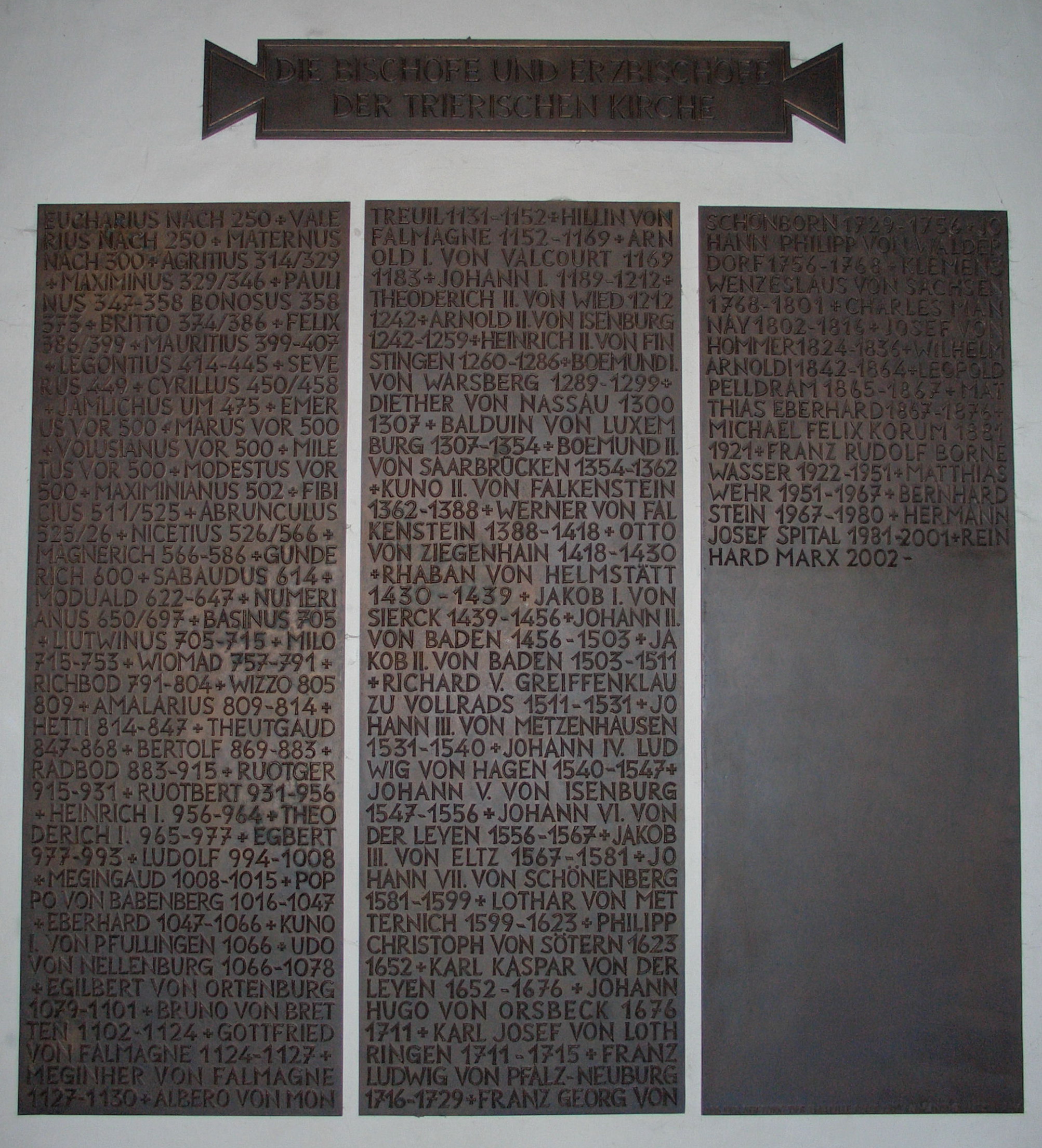Felix of Trier on:
[Wikipedia]
[Google]
[Amazon]
 Felix of Trier ( fl. c. 386–399) was
Felix of Trier ( fl. c. 386–399) was
 Felix of Trier ( fl. c. 386–399) was
Felix of Trier ( fl. c. 386–399) was bishop of Trier
The Diocese of Trier, in English historically also known as ''Treves'' (IPA "tɾivz") from French ''Trèves'', is a Latin Church ecclesiastical territory or diocese of the Catholic church in Germany.GCatholic: Diocese of Trier
/ref> His episcopate was marked by the trial of
/ref> His episcopate was marked by the trial of
Priscillian
Priscillian (in Latin: ''Priscillianus''; Gallaecia, - Augusta Treverorum, Gallia Belgica, ) was a wealthy nobleman of Roman Hispania who promoted a strict form of Christian asceticism. He became bishop of Ávila in 380. Certain practices of his f ...
and his followers and their subsequent execution for heresy and witchcraft, which can be seen as the first inquisitorial action in the Church.
The death sentences against Priscillian and his followers, despite the vigorous opposition of many bishops of the West, including celebrities such as Martin of Tours
Martin of Tours ( la, Sanctus Martinus Turonensis; 316/336 – 8 November 397), also known as Martin the Merciful, was the third bishop of Tours. He has become one of the most familiar and recognizable Christian saints in France, heralded as the ...
and Ambrose of Milan
Ambrose of Milan ( la, Aurelius Ambrosius; ), venerated as Saint Ambrose, ; lmo, Sant Ambroeus . was a theologian and statesman who served as Bishop of Milan from 374 to 397. He expressed himself prominently as a public figure, fiercely promot ...
, were to have bitter consequences for Felix: Pope Siricius
Pope Siricius (334 – 26 November 399) was the bishop of Rome from December 384 to his death. In response to inquiries from Bishop Himerius of Tarragona, Siricius issued the ''Directa'' decretal, containing decrees of baptism, church discipline ...
, Martin of Tours, Ambrose of Milan and other bishops broke off fellowship with all the bishops who took part in the trial of Priscillian. Felix was accused of not having campaigned vigorously enough against the verdict.
At a Synod of Bishops in 398 at Turin all bishops were readmitted to communion with Rome
, established_title = Founded
, established_date = 753 BC
, founder = King Romulus (legendary)
, image_map = Map of comune of Rome (metropolitan city of Capital Rome, region Lazio, Italy).svg
, map_caption ...
, provided that they undertook to have nothing to do with Felix, who was thus largely isolated. In 398 he renounced his bishopric.
Felix returned the relics of Paulinus of Trier
Saint Paulinus of Trier (died 358) was bishop of Trier and a supporter of Athanasius in the conflict with Arianism. At the Synod of Arles (353) he was targeted by the Arians, and was exiled to Phrygia, being effectively singled out by the Empero ...
from Phrygia
In classical antiquity, Phrygia ( ; grc, Φρυγία, ''Phrygía'' ) was a kingdom in the west central part of Anatolia, in what is now Asian Turkey, centered on the Sangarios River. After its conquest, it became a region of the great empires ...
to Trier
Trier ( , ; lb, Tréier ), formerly known in English as Trèves ( ;) and Triers (see also names in other languages), is a city on the banks of the Moselle in Germany. It lies in a valley between low vine-covered hills of red sandstone in the ...
and built a church to house them which is among the predecessors of the present St. Paulinus' Church, in the crypt of which he is buried.
His feast day
The calendar of saints is the traditional Christian method of organizing a liturgical year by associating each day with one or more saints and referring to the day as the feast day or feast of said saint. The word "feast" in this context d ...
is 26 March.
References
{{authority control Gallo-Roman saints Saints of Germania 4th-century Christian martyrs Year of birth unknown 4th-century bishops in Germania 4th-century Christian saints Roman Catholic bishops of Trier